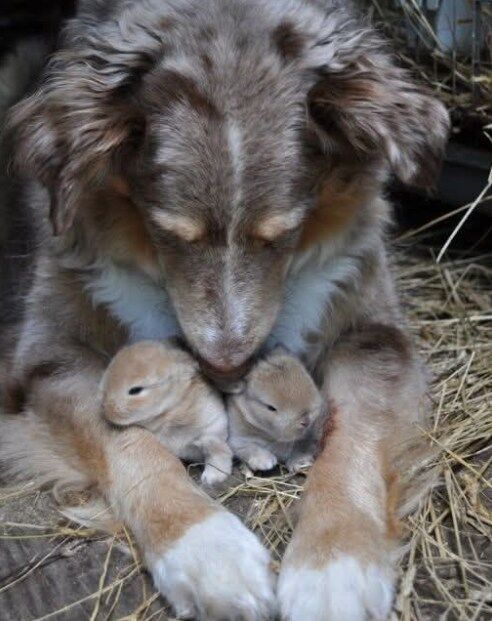Every morning, I’d head out to check the garden—and come back fuming. Nibbled carrots. Uprooted lettuce. A bean vine chewed clean through. I even installed a motion-activated light and a trail cam, convinced that if I could catch the sneaky thief in the act, I could scare it off for good. I was prepared for raccoons, foxes, maybe even a hungry deer. What I wasn’t prepared for—what never crossed my mind—was that the truth would break my heart and rebuild it all in one breath.
It started the morning Runa didn’t show up for breakfast.
Runa’s never been the clingy type. There’s some shepherd in her, sure, but it’s her spirit that’s always stood out—independent, strong-willed, a little wild. As a pup, she used to curl up under the porch and refuse to come inside, even in pouring rain. After her last litter didn’t survive, something in her changed. She stopped chasing shadows, stopped playing fetch. Mostly, she slept. Sometimes she’d spend whole nights in the barn, lying silent, like the world had nothing left for her.
That morning, I figured she was out there again—ignoring my calls, sleeping through the noise. But something felt off. Maybe it was instinct. Or guilt—I hadn’t exactly been patient with her lately, too caught up fixing fences and chasing imaginary foxes. So I grabbed a biscuit from the jar, pulled on my boots, and headed out to the barn.
Inside, everything was quiet. Dust drifted through the early sunlight breaking between the wooden slats. The familiar smells of hay, old tools, and motor oil wrapped around me. But there was something else. A faint sound I couldn’t place—soft, almost too soft.
I stepped around the hay bales and crouched by the crate pile we hadn’t touched since spring.
There it was again.
A low, aching whimper.
I leaned in and peered behind the crates. There she was—Runa, curled protectively around something, her body tight and still, coiled like a spring. I whispered her name, afraid she’d bolt or bare her teeth. But she didn’t. She just looked up with those amber eyes, full of something deep—fear, maybe. Or sorrow.
Then I saw them.
Two tiny shapes nestled against her. At first, I thought they were puppies. Maybe someone had dumped a litter and she found them. But no—these were baby rabbits. Fragile. Eyes still closed. Barely breathing.
And Runa was nursing them.
I didn’t move. Didn’t speak. I just stared, trying to process it. My dog—the same one who used to bark herself hoarse at squirrels—was now gently licking the downy fur of two orphaned bunnies like they were her own.
It made no sense.
Then I caught a flash of red behind the crates.
I thought it was a fox at first. I moved closer, heart pounding, and carefully slid one of the crates aside. What I saw was worse.
A rabbit. An adult. Dead.
There was no blood, just a lifeless stillness that said enough. Her fur was matted, one leg twisted wrong. It looked like she’d dragged herself there, trying to reach safety. Trying to reach her babies.
She didn’t make it.
I sat back, stunned. That rabbit—she’d probably been the one raiding my garden all along. Stealing food to stay alive. To feed her kits. And now, she was gone… but Runa had found them.
No—Runa had saved them.
And all those vegetables I thought were casualties of some nighttime predator? They weren’t attacks. They were the desperate actions of a mother doing whatever she could to care for her young. And all this time, I’d been setting traps.
I looked at Runa again. She rested her head between her paws, shielding the babies. She didn’t quite trust me—but she hadn’t run. That meant something.
I stayed with her until the sun dipped behind the barn. Then, gently, I pulled the biscuit from my pocket, broke it in half, and offered her a piece. She took it, cautiously. When I reached toward the babies, she tensed… then slowly relaxed.
They were warm. Breathing. Alive.
In the days that followed, I set up a blanket and a shallow box in the barn. I brought food and water. I read everything I could about caring for wild rabbits. Runa never left them for long. And each time I checked, they were a little stronger. By the second week, their eyes were open. They started hopping—wobbly, curious—and Runa followed close behind, like a proud mom watching toddlers learn to walk.
When I told the neighbors, they thought I’d lost my mind. “A dog raising rabbits? That’s not normal,” one said. Maybe not. But it was something better. It was grief finding purpose. Instinct turning into love.
Eventually, the rabbits were old enough to leave. One morning, the box was empty. Runa spent the whole day sitting in the grass, watching the woods, ears perked, nose twitching at every breeze.
But she didn’t cry. She didn’t chase after them.
She knew her part was done.
Months passed. The garden grew back—though I still lose a carrot now and then. Runa sleeps indoors now, curled up at the foot of my bed. She’s still got that wild edge, but there’s a softness to it now. A calm.
Like she knows something we often forget: love doesn’t always come in the shape we expect. And family isn’t just who we’re born to—it’s who we choose to protect when it matters most.
So now, whenever I see a flicker of red at the edge of the woods, or hear a rustle by the beans, I don’t get angry. I don’t set traps.
I just watch. And wonder.
Because sometimes, what you think is a nuisance… turns out to be a miracle in disguise.
If this story moved you even half as much as it moved me to live it, please share it. You never know who might need a reminder that hope can still grow in the unlikeliest places.

